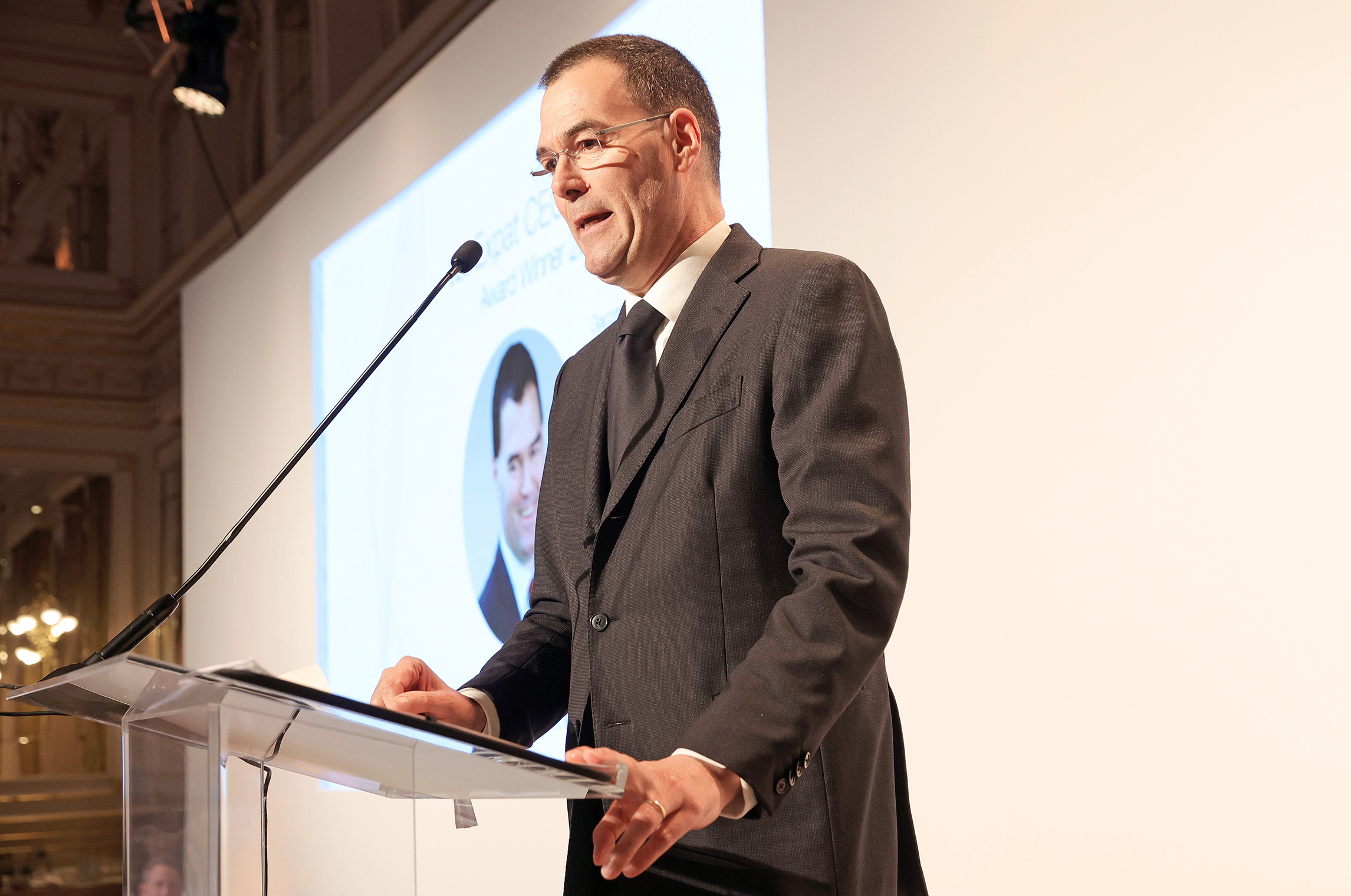‘Innovating and Investing’ Toward Greater European Self-reliance in Food

Giacomo Pedranzini, winner of the Expat CEO of the Year Award 2022.
Photo by Marianna Sárközy.
Giacomo Pedranzini, winner of the Expat CEO of the Year Award 2022, talks with the Budapest Business Journal about the Italian expat business community in Hungary, life in Kaposvár, and the future of the country’s food industry.
BBJ: Congratulations on your win. What went through your mind when you heard your name called out?
Giacomo Pedranzini: I was, of course, happy and honored when it turned out that I won this award, and the memories of long-lasting difficult times came to my mind. Nothing in life is in vain, and even if what really counts are your actions and deeds, acknowledgments and awards can be the cherry on the cake.
BBJ: You became the first Italian shortlisted for the award and the first to win it. How strong is the Italian business community in Hungary, and what does this recognition mean to them, do you think?
GP: It was a surprise for me that there had not been an Italian CEO shortlisted up to now, although it is true that this award was established only eight years ago. The Italian economic community is contributing in a pretty significant way to the development of this country. So, I hope that others will follow in the future. I was pleased to be introduced, for example, to the new CEO of Mercedes-Benz in Hungary, who is not only Italian but also a lady. I hope to have broken the “glass ceiling,” and I’m confident that an Italian representative will again be on the podium soon in the coming years.
BBJ: Presumably, you also view this as recognition for your colleagues at Kometa 99 as well as yourself. What makes your team unique?
GP: We are operating in a traditional but at the same time exceptional sector: meat processing. Here, apart from your knowledge and training regarding this business, your daily practical-operative commitment and attention to the operation are the most important. The Kometa team is special because they are strongly dedicated to the company. We are, unfortunately, suffering from a shortage of labor force and, in such a situation, we can often only guarantee regular supply to our customers thanks to overtime. I genuinely admire that this team always performs these hard work hours with dedication to our company, without complaint.
BBJ: How difficult is it for an expat to manage a Hungarian business? What are the secrets to your success?
GP: I think what I am saying is valid not only for Hungary but any foreign country. An expat CEO should take care, first of all, to get well acquainted with the culture and history of the country and should also learn the local language as soon as possible. Unfortunately, I did not invest enough time at the beginning of my stay in Hungary to reach proficiency; after 27 years, my skills are good enough, but not as good as they should be. I should have invested more time right at the beginning in my Hungarian studies. It would have made my work much easier and smoother. So, this is my advice to newcomers to this country.
BBJ: You spoke in your acceptance speech about wanting to restore Hungary’s position as a producer of quality food products. How do you judge its reputation today, and why is this important?
GP: Food itself is getting more and more important in the life of people, with more attention to the quality, its healthiness and the pleasure it adds to life. In the past weeks, we are also experiencing the importance of having enough food and the risks of depending too much on imports. Hungary has good potential as a food producer and, even today, holds prestige on the global stage as such. The chance is there to make our reputation stronger, to produce and export even higher quality food in ever higher quantities. In a moment when our dependence on Ukraine and Russia has shown us its risks, creating the possibility to be more self-sufficient has become a priority. Hungary can play a crucial role in improving the self-sufficiency of the EU in food production.
BBJ: What is the greatest lesson you have learned while running Kometa 99?
GP: Perhaps that the environment we are working in is more and more volatile; changes can happen from one day to the next. And they can be so relevant as to put your business at risk. For me, the most important lesson is the need for prudent behavior in business. I am an optimistic person, perhaps even too optimistic, and so sometimes I was not prudent enough. Being prudent does not mean you hesitate in making a decision. It means making a sound evaluation of the situation and taking a rational decision based on reasons and not emotions.
BBJ: What plans do you have for growing the business?
GP: The economy is concentrating continuously, and the size of significant players is getting larger. I do not necessarily agree with this trend, but this is the reality we have to accept. If we look at our markets and customers, they are mainly multinational retailers and HoReCa [hotel, restaurant and catering] chains. They are constantly growing, and we must grow as well to keep our role as a strategic supplier. Back for a moment to Hungary: we want to be a key player in European food production. We want to contribute to the self-reliance of Europe regarding food safety, and in Hungary, we can play an important role in achieving this goal. We want to do it both through innovation and investment, as well as growth in the size of the business.
BBJ: You live “above the shop” on top of the office building in Kaposvár. What is the city like? Do you feel you miss out by being away from the economic and political center of Budapest?
GP: Each of us has our own personality. I like to live a simple life and focus on my primary responsibilities and duties. Kaposvár is a nice city, with opportunities for entertainment and cultural events. From time to time, I miss the more energetic environment you can experience in a big city like Budapest, so with my wife, I take opportunities for a weekend in the capital.
BBJ: Is there anything else you would like to add?
GP: Thank you for acknowledging my work with this award, and thank you to Hungary and to Hungarians for the opportunities they have offered me.
This article was first published in the Budapest Business Journal print issue of April 22, 2022.
SUPPORT THE BUDAPEST BUSINESS JOURNAL
Producing journalism that is worthy of the name is a costly business. For 27 years, the publishers, editors and reporters of the Budapest Business Journal have striven to bring you business news that works, information that you can trust, that is factual, accurate and presented without fear or favor.
Newspaper organizations across the globe have struggled to find a business model that allows them to continue to excel, without compromising their ability to perform. Most recently, some have experimented with the idea of involving their most important stakeholders, their readers.
We would like to offer that same opportunity to our readers. We would like to invite you to help us deliver the quality business journalism you require. Hit our Support the BBJ button and you can choose the how much and how often you send us your contributions.








